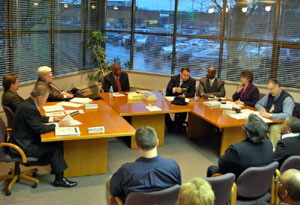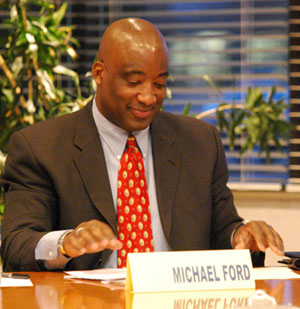AATA Interviews Two; Re-Interview to Follow

Michael Ford's interview by the full AATA board. From left to right: Ted Annis, Charles Griffith, Jesse Bernstein, Michael Ford, David Nacht, Paul Ajegba, Sue McCormick, Rich Robben.
The board of the Ann Arbor Transportation Authority met at AATA headquarters on South Industrial Wednesday morning to conduct public interviews of the two finalists for the executive directorship of the organization. The field had been narrowed down to two candidates after interviews of five finalists two weeks ago: Carl Jackson, currently general manager and CEO of the Macon Transit Authority in Macon, Georgia; and Michael Ford, currently with MG Ford Consulting in Camas, Washington, and formerly assistant general manager and COO of the San Joaquin Regional Transit District.
No decision has been made to make an offer based on the interviews. Ford is to be re-interviewed either in Ann Arbor, by video conference, or some other means with a timetable as yet undetermined.
The Chronicle was able to observe the hour-long session with Ford, which started around 8 a.m., but due to other commitments could not stay for Jackson’s interview. Touching base with board member Jesse Bernstein later in the day, he said the questions put to both candidates were the same. Various follow-up questions asked of Ford may not necessarily have been asked of Jackson. In all cases, the phrasing of the questions reflects a paraphrase by The Chronicle, not necessarily an exact quote. The questioning proceeded from right-to-left (audience perspective) around the board table:
Interview Questions Asked by AATA Board
- How would you deal with a management subordinate who is not performing up to expectation? (Rich Robben)
- What have you done in your last position to improve cost effectiveness? (David Nacht)
- Have you ever looked at metrics like dollars-per-service-hour or dollars-per-service-mile? (Nacht)
- Have you had to deal directly with elected officials? How would you go about creating a constructive relationship with them? (Sue McCormick)
- If you were in this position, how would you propose to keep the board informed? (McCormick)
- How do you prefer that the board communicate with staff? (McCormick) Follow-up from Bernstein: How would you feel about a member of the board going directly to maintenance staff about the issue of cleanliness of the buses?
- The board expects the CEO to be responsive to the community. How would you get out into the community? (Paul Ajegba) Followup from McCormick: Given that you need to be the “face of the AATA,” how would you approach doing that in the first 30 days on the job?
- Suppose there is a situation where you are right and the board is wrong. How would you handle that situation? (Ajegba) Followup from McCormick: What one word would you use to describe the relationship you want to have with the board?
- What legacy are you going to be leaving behind at your last job? What would people at that job say about your leadership style? (Nacht) Follow-up from Nacht: What’s one thing you left behind that’s there because you were there?
- In an environment of service changes and tight budgets, there may be pressure on board members to try to micro-manage AATA decisions. How would you handle the board’s expectations? (Nacht)
- The AATA is “governed” by a seven-member board appointed by the mayor of Ann Arbor. Please define what “governed” means as it applies to the board’s authority and responsibility. (Bernstein)
- How do you measure the success of your transit organization? Are there key indicators that are relevant to evaluating performance? (Bernstein)
- Given what you know about our transportation system here and your experience, what have you done that would help us here? (Charles Griffith)
- Under normal circumstances, what kind of decisions would you delegate to staff and which kind would you reserve for yourself? (Griffith)
- How would you use the comparative database of national transit data in evaluating AATA? (Ted Annis)
- What is your biggest concern in lack of experience for this particular job? Where will your steepest learning curve be? (Nacht)
- What were your annual travel budgets in your previous position? (Annis)
- What is your general rule-of-thumb approach with staff to industry participation? (McCormick)

Before the board entered the room to conduct the interview, Michael Ford, sitting alone at the board table, reviewed material in front of him. Something he saw caused him to break a smile.
In our phone conversation with Bernstein, he noted that for any job and any pool of candidates, “there’s never any perfect candidate.” In explaining that the board had not yet made an offer, he said that they wanted to collect additional information before doing so. That will start with a re-interview of Michael Ford.
Bernstein said that the board would like to make an offer as soon as possible.
Previous reporting by The Chronicle includes an article on the announcement of the two finalists.



